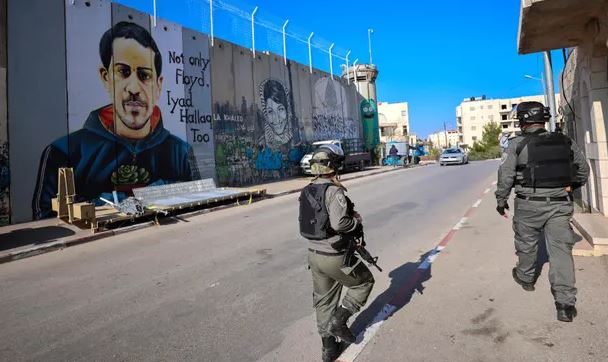Israel is committing the crime of apartheid, rights group says

Human Rights Watch calls on international criminal court to investigate ‘systematic discrimination’ against Palestinians
Human Rights Watch has accused Israeli officials of committing the crimes of apartheid and persecution, claiming the government enforces an overarching policy to “maintain the domination by Jewish Israelis over Palestinians”.
In a report released on Tuesday, the New York-based advocacy group became the first major international rights body to level such allegations. It said that after decades of warnings that an entrenched hold over Palestinian life could lead to apartheid, it had found that the “threshold” had been crossed.
“This is the starkest finding Human Rights Watch has reached on Israeli conduct in the 30 years we’ve been documenting abuses on the ground there,” said Omar Shakir, the group’s Israel and Palestine director. Shakir said his organisation had never before directly accused Israeli officials of crimes against humanity.
Responding to the claims, Israel’s foreign ministry accused Human Rights Watch of a “longstanding anti-Israeli agenda” and said the report was a “propaganda pamphlet” that had “no connection to facts or reality on the ground”.
“The fictional claims that HRW concocted are both preposterous and false,” it said.
Palestinian officials and agencies welcomed the report, including the foreign ministry, which said it exposed “Israel’s colonial occupation and its discriminatory and racist policies against the Palestinian people”.
The report drew on years of human rights documentation, analysis of Israeli laws, a review of government planning documents, and statements by officials.
Human Rights Watch compared policies and practices towards nearly 7 million Palestinians in the occupied territories and within Israel with those concerning roughly the same number of Jewish Israelis living in the same areas.
It concluded there was a “present-day reality of a single authority, the Israeli government … methodologically privileging Jewish Israelis while repressing Palestinians, most severely in the occupied territory.”
First used in relation to South Africa’s racist segregation against non-white citizens, apartheid – which is Afrikaans for “apartness” – is a crime against humanity under international law.
Under the 1998 Rome statute that established the international criminal court (ICC), apartheid is defined as an “institutionalised regime of systematic oppression and domination by one racial group over any other” with the intent of “maintaining that regime”. Persecution, which is also a crime against humanity, is defined as “the intentional and severe deprivation of fundamental rights” of a group of people.
Human Rights Watch said that inside Israel – where about a fifth of the 9 million citizens are Palestinians – and in the occupied territories, authorities had sought to maximise the land available for Jewish communities and concentrate most Palestinians in dense population centres.
“The authorities have adopted policies to mitigate what they have openly described as a demographic ‘threat’ from Palestinians,” it said, referencing concerns expressed by Israeli politicians that a majority Palestinian population would endanger the Jewish state. “In Jerusalem, for example, the government’s plan for the municipality … sets the goal of ‘maintaining a solid Jewish majority in the city’ and even specifies the demographic ratios it hopes to maintain.”
It said Israeli authorities “systematically discriminate against Palestinians”. This was most extreme in the occupied territories, it said, including the West Bank, which Israel captured in the six-day war in 1967. Several hundred thousand Israeli settlers now live there as citizens while about 2.7 million Palestinians are not and live under military rule.
Human Rights Watch’s executive director, Kenneth Roth, said this was not simply “an abusive occupation”. “These policies, which grant Jewish Israelis the same rights and privileges wherever they live and discriminate against Palestinians to varying degrees wherever they live, reflect a policy to privilege one people at the expense of another,” Roth said.
When similar allegations have been raised in the past, Israel has taken particular offence to the claim it discriminates against Palestinian citizens of the country, also known as Arab Israelis. It cites equal rights laws and the fact that Arabs are represented in government and the judicial system.
Regarding the occupied West Bank, Israel points to agreements signed in the 1990s that afforded Palestinians limited self-rule there. However, Human Rights Watch says the Israeli government still “retains primary control over many aspects” of their lives, including borders, natural resources and movement of people and goods.
Meanwhile, about 2 million Palestinians live under a strict blockade in Gaza. Israeli forces pulled out of Gaza in 2005 but still maintain control of its borders, sea and airspace.
The report follows similar findings by Israeli rights bodies, including a January announcement by B’Tselem that claimed the country was not a democracy but an “apartheid regime”. One other domestic group, Yesh Din, published a legal opinion last summer in which it argued that apartheid was being committed, but limited its findings to the West Bank. Israel strongly rejected those claims.
A shift in perception towards apartheid is part of a movement led by activists that gained momentum following Israeli annexation threats they claim prove the occupation is permanent, as well as laws that enshrine extra political rights for Jews over Arabs, two developments that Human Rights Watch cited in its report.
It called on the ICC prosecutor to “investigate and prosecute those credibly implicated” and called for sanctions including travel bans and asset freezes on responsible officials, without naming them.
Last year the same rights group found that abuses by the Myanmar government against Rohingya Muslims also amounted to the crimes of apartheid and persecution.
Source: The Guardian

WRITE YOUR COMMENT